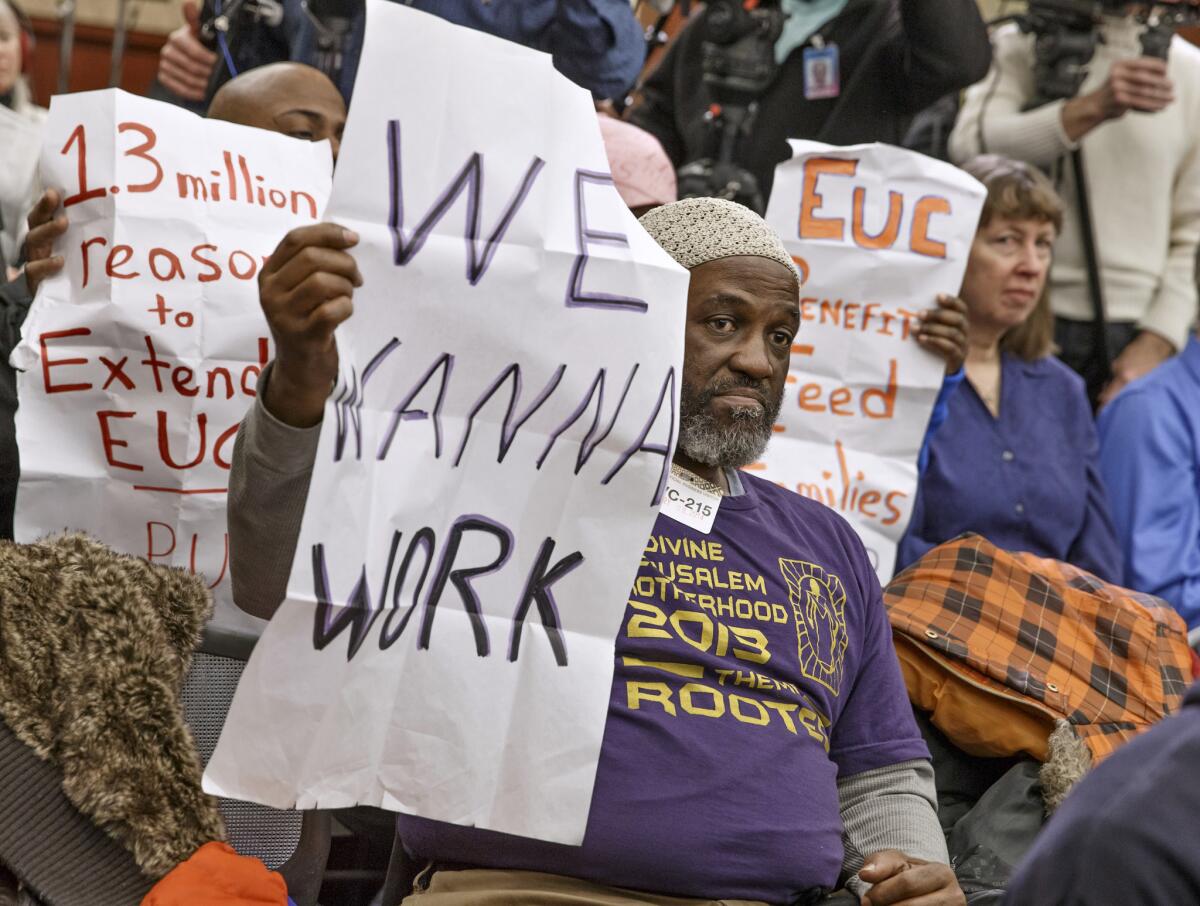Not a good week to be poor or unemployed in America

- Share via
It hasn’t been a good week to be poor or unemployed in America. Or a good few years, for that matter. Some 850,000 low-income families in 15 states, including California, lost help in the farm bill that President Obama signed into law Friday. On Thursday, the Senate failed to move forward on a bill to restore long-term unemployment benefits affecting some 1.7 million people. Also Friday, the Bureau of Labor Statistics released the unemployment numbers for January, which reported disappointing private-sector job growth. Again.
There are a lot of things to say about these individual topics. Yes, the cut in food stamps in the farm bill — $8 billion over 10 years — was in reality the closing of a loophole that slipped more benefits to the poor in some states than they otherwise would have received (the Washington Post explains it well here). I’m not sure the morally correct response to that is to make hungry people hungrier or poor people poorer.
Congressional opponents of extending long-term unemployment benefits say they worry about adding future debt to ease financial pain now, an argument that might carry weight if Congress was also concerned about the long-term impact of the tax subsidies it continues to give to the incredibly profitable big oil companies (not a lot of hunger or financial pain in those boardrooms), among others.
As for persistently high levels of joblessness, corporations are sitting on stockpiles of cash instead of adding jobs that would in turn add spending to the economy. That’s a logjam the federal government has yet to figure out how to unblock.
We have a tendency in our political debates to focus on the short term and the immediate future. As a result, Congress and the Obama administration have been fumbling around the edges of aid programs while doing little to forge broader, comprehensive plans for addressing socioeconomic problems — persistent unemployment, intergenerational poverty and regressing local economies in urban cores and small Midwestern cities — that by all indications will not go away even if the economy gets humming again.
We in the media bear some of the blame by our focus on the here-and-now: the daily Wall Street indexes, the monthly unemployment reports (see above), corporate earnings. We need to be less reactive to the latest release and to look more deeply into how the economy works, how free-trade deals emphasize corporate health over the health of American communities, how federal policies and labor laws make it harder for the middle class to stay in the middle class, and how federal tax policies make it easier for corporations to skirt their American tax obligations. Instead, we handicap political debates like sporting events and speculate on how a certain stance might affect an election months, or years, in the future.
Looking at these socioeconomic issues more broadly should give the country pause, and maybe lead us to contemplate different approaches and different analyses. The fresh cuts in food stamps, the pulled support for the long-term unemployed and the staggering number of jobless or underemployed all mask a bigger problem: a political blindness and disregard for what life is like for a large percentage of our fellow citizens.
ALSO:
Syria’s horrific war on its own children
Why is L.A. County picking a fight over a cross on its seal?
To help rein in healthcare costs, give ‘narrow networks’ a try
Follow Scott Martelle on Twitter @smartelle
More to Read
A cure for the common opinion
Get thought-provoking perspectives with our weekly newsletter.
You may occasionally receive promotional content from the Los Angeles Times.







